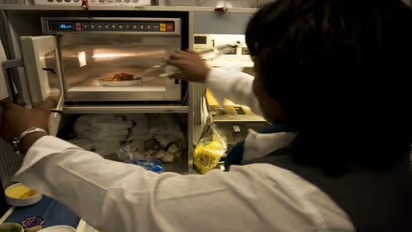Why you should NEVER reheat some of your foods? Experts reveal TOP reasons

Synopsis
Renowned dietitian Harini Bala recently cautioned her followers about three foods in our kitchens that should never be reheated. These foods, she explained, can undergo chemical changes when reheated or foster harmful bacteria, posing severe health risks.
For most households, leftovers serve as a quick fix for busy evenings. Yet, according to dietary experts, reheating certain foods could transform them into silent health hazards. Renowned dietitian Harini Bala recently cautioned her followers about three foods in our kitchens that should never be reheated. These foods, she explained, can undergo chemical changes when reheated or foster harmful bacteria, posing severe health risks.
The Spinach Hazard
Topping the list is spinach, a leafy green celebrated for its nutritional value. However, Ms Bala warned that spinach contains oxalic acid, which is harmless when raw but crystallizes into a toxic form upon reheating. "In high doses, it can increase the risk of kidney stones," she explained, referring to painful clusters of crystals that form in the urinary tract.
She added, "It also contains nitrates that convert into nitrites when reheated, and these are toxic." Nitrites are known to combine with gut chemicals, potentially increasing the risk of bowel cancer.
Beyond its chemical risks, spinach can harbor listeria if not heated thoroughly—a bacteria linked to foodborne illnesses. Symptoms include fever, headaches, confusion, and even seizures, highlighting the need for caution.
Bitter Brews: The Tea Warning
Bala's next caution was surprising: tea. While reheating might seem harmless, she noted it can intensify bitter tannins and awaken dormant bacteria. The result? An unappetizing and potentially unsafe beverage.
The Riskiest Leftover: Rice
Finally, Bala declared rice the most dangerous food to reheat. "When cooked rice cools, it can harbor Bacillus cereus," she explained. This bacteria, commonly found in soil, is heat-resistant, meaning reheating won’t necessarily eliminate the threat.
Symptoms from Bacillus cereus contamination include vomiting, diarrhea, and abdominal pain. To reduce risk, Ms. Bala advised strict storage practices: "It can be reheated if you're storing it within two hours [after cooking] in the fridge in an airtight container.
A 20-year-old Belgian man tragically died from ‘fried rice syndrome’ after consuming reheated spaghetti that had been left out for five days. Post-mortem findings revealed liver necrosis, with Bacillus cereus as the cause.
Also read: Why you should never wrap leftover food in aluminum foil, experts reveal deadly risks
Stay updated with the Breaking News Today and Latest News from across India and around the world. Get real-time updates, in-depth analysis, and comprehensive coverage of India News, World News, Indian Defence News, Kerala News, and Karnataka News. From politics to current affairs, follow every major story as it unfolds. Get real-time updates from IMD on major cities weather forecasts, including Rain alerts, Cyclone warnings, and temperature trends. Download the Asianet News Official App from the Android Play Store and iPhone App Store for accurate and timely news updates anytime, anywhere.